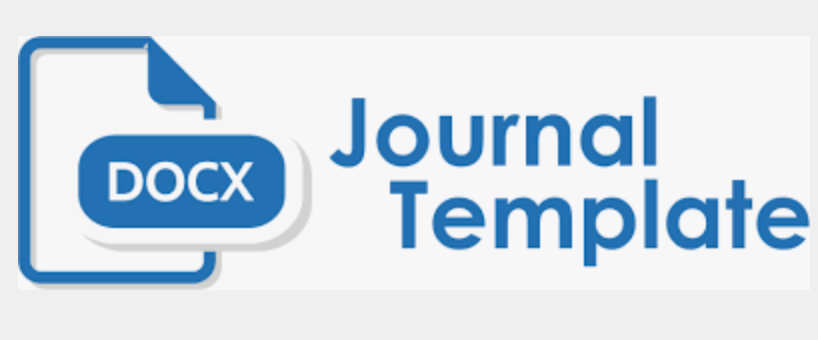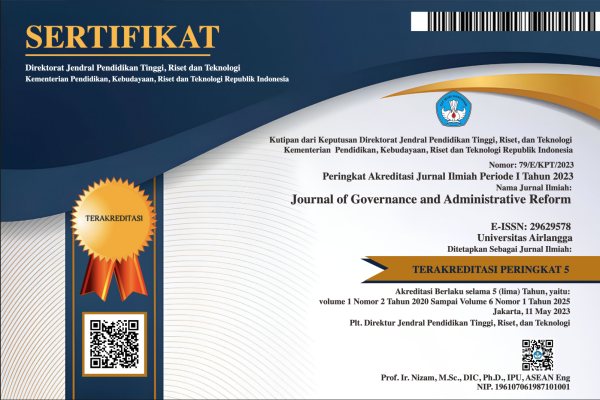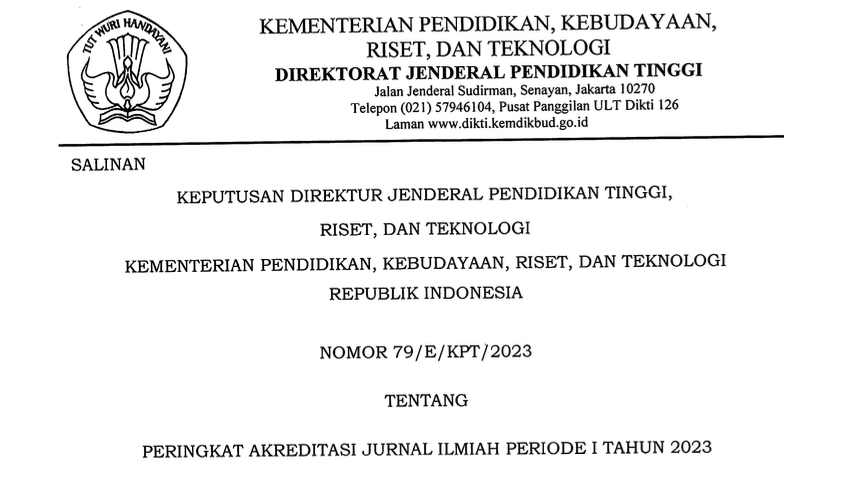Technology-Based Change Management: The Potential of Social Media in Public Sector Transformation
Downloads
Abstract
This research examines the utilization of social media by Regional Government Organizations (Organisasi Perangkat Daerah, OPD) in the City of Kupang, focusing on its potential to enhance transparency, accountability, and public participation in governance processes. Adopting a qualitative approach through an embedded single-case study design, the study aims to provide a comprehensive understanding of the challenges and opportunities associated with the integration of social media in public administration. Data were gathered through interviews, document analysis, and direct observation, with the analysis involving categorization, interpretation, and inductive reasoning. The findings suggest that although social media offers significant opportunities for improving public engagement and facilitating real-time communication, its implementation faces considerable obstacles. These challenges include organizational resistance, inadequate digital competencies among staff, and the absence of a well-defined strategy. The study underscores the critical role of strategic change management, emphasizing continuous capacity building, transformational leadership, and a robust communication framework to effectively address these challenges. This research contributes to the growing body of knowledge on the role of social media in modernizing local governance and highlights the importance of aligning organizational culture to foster technological innovation. By addressing the knowledge gap regarding digital transformation in regional bureaucracies, the findings offer practical insights for policymakers and provide a foundation for future comparative studies across different regions.
Keywords: change management; public governance; social media.
Abstrak
Penelitian ini mengkaji pemanfaatan media sosial oleh Organisasi Perangkat Daerah (OPD) di Kota Kupang, dengan fokus pada potensinya untuk meningkatkan transparansi, akuntabilitas, dan partisipasi publik dalam tata kelola pemerintahan. Penelitian ini menggunakan pendekatan kualitatif dengan desain studi kasus tunggal embedded untuk memperoleh pemahaman yang komprehensif mengenai tantangan dan peluang adopsi media sosial dalam administrasi publik. Pengumpulan data dilakukan melalui wawancara, analisis dokumen, dan observasi, dengan analisis data melibatkan kategorisasi, interpretasi, dan penalaran induktif. Temuan menunjukkan bahwa meskipun media sosial menawarkan peluang besar untuk meningkatkan keterlibatan publik dan komunikasi secara real-time, implementasinya menghadapi tantangan signifikan, termasuk resistensi organisasi, keterbatasan keterampilan digital pegawai, dan ketiadaan strategi yang terstruktur. Penelitian ini menyoroti pentingnya manajemen perubahan strategis yang mencakup pengembangan kapasitas berkelanjutan, kepemimpinan transformasional, dan kerangka komunikasi yang lebih baik untuk mengatasi hambatan tersebut. Studi ini memberikan kontribusi pada pemahaman peran media sosial dalam memodernisasi tata kelola lokal dan menekankan pentingnya adaptasi budaya organisasi untuk mendukung inovasi teknologi. Dengan menjembatani kesenjangan pengetahuan terkait transformasi digital dalam birokrasi daerah, temuan ini memberikan implikasi praktis bagi pembuat kebijakan dan menjadi referensi bagi studi komparatif lebih lanjut di wilayah lain.
Kata kunci: manajemen perubahan; tata kelola publik; media sosial.
Arshad, S., & Khurram, S. (2020). Can government’s presence on social media stimulate citizens’ online political participation? Investigating the influence of transparency, trust, and responsiveness. Government Information Quarterly, 37(3). https://doi.org/10.1016/j.giq.2020.101486
Ashok, M., Al Badi Al Dhaheri, M. S. M., Madan, R., & Dzandu, M. D. (2021). How to counter organisational inertia to enable knowledge management practices adoption in public sector organisations. Journal of Knowledge Management, 25(9). https://doi.org/10.1108/JKM-09-2020-0700
Banghart, S., Etter, M., & Stohl, C. (2018). Organizational Boundary Regulation Through Social Media Policies. Management Communication Quarterly, 32(3). https://doi.org/10.1177/0893318918766405
Birdi, K. (2021). Insights on impact from the development, delivery, and evaluation of the CLEAR IDEAS innovation training model. European Journal of Work and Organizational Psychology, 30(3). https://doi.org/10.1080/1359432X.2020.1770854
Bloom, N., Van Reenen, J., & Williams, H. (2019). A toolkit of policies to promote innovation. In Journal of Economic Perspectives (Vol. 33, Issue 3). https://doi.org/10.1257/jep.33.3.163
Chen, Q., Hu, J., Zhang, W., Evans, R., & Ma, X. (2021). Employee use of public social media: theories, constructs and conceptual frameworks. Behaviour and Information Technology, 40(9). https://doi.org/10.1080/0144929X.2020.1733089
Creswell, W. J., & Creswell, J. D. (2018). Research Design: Qualitative, Quantitative adn Mixed Methods Approaches. In Journal of Chemical Information and Modeling (Vol. 53, Issue 9).
Criado, J. I., & Villodre, J. (2018). Public employees in social media communities: Exploring factors for internal collaboration using social network analysis. First Monday, 23(4). https://doi.org/10.5210/fm.v23i4.8348
Criado, J. I., & Villodre, J. (2021). Delivering public services through social media in European local governments. An interpretative framework using semantic algorithms. Local Government Studies, 47(2). https://doi.org/10.1080/03003930.2020.1729750
DePaula, N., & Dincelli, E. (2018). Information strategies and affective reactions: How citizens interact with government social media content. First Monday, 23(4). https://doi.org/10.5210/fm.v23i4.8414
Duryan, M., & Smyth, H. (2019). Cultivating sustainable communities of practice within hierarchical bureaucracies: The crucial role of an executive sponsorship. International Journal of Managing Projects in Business, 12(2). https://doi.org/10.1108/IJMPB-03-2018-0040
Gálvez-Rodríguez, M. del M., Sáez-Martín, A., García-Tabuyo, M., & Caba-Pérez, C. (2018). Exploring dialogic strategies in social media for fostering citizens’ interactions with Latin American local governments. Public Relations Review, 44(2). https://doi.org/10.1016/j.pubrev.2018.03.003
Gatewood, J., Monks, S. L., Singletary, C. R., Vidrascu, E., & Moore, J. B. (2020). Social media in public health: Strategies to distill, package, and disseminate public health research. Journal of Public Health Management and Practice, 26(5). https://doi.org/10.1097/PHH.0000000000001096
Ghermandi, A., & Sinclair, M. (2019). Passive crowdsourcing of social media in environmental research: A systematic map. Global Environmental Change, 55. https://doi.org/10.1016/j.gloenvcha.2019.02.003
Haro-de-Rosario, A., Sáez-Martín, A., & del Carmen Caba-Pérez, M. (2018). Using social media to enhance citizen engagement with local government: Twitter or Facebook? New Media and Society, 20(1). https://doi.org/10.1177/1461444816645652
Jimenez-Marquez, J. L., Gonzalez-Carrasco, I., Lopez-Cuadrado, J. L., & Ruiz-Mezcua, B. (2019). Towards a big data framework for analyzing social media content. International Journal of Information Management, 44. https://doi.org/10.1016/j.ijinfomgt.2018.09.003
Kementerian Komunikasi dan Informatika. (2022). Status Literasi Digital di Indonesia 2022. https://aptika.kominfo.go.id/wp-content/uploads/2023/02/Report_Nasional_2022_FA_3101.pdf
Lai, C. H., Ping Yu, R., & Chen, Y. C. (2020). Examining Government Dialogic Orientation in Social Media Strategies, Outcomes, and Perceived Effectiveness:A Mixed-Methods Approach. International Journal of Strategic Communication, 14(3). https://doi.org/10.1080/1553118X.2020.1749634
Lin, Y., & Kant, S. (2021). Using social media for citizen participation: Contexts, empowerment, and inclusion. Sustainability (Switzerland), 13(12). https://doi.org/10.3390/su13126635
Lomoschitz, F. M., & Stummer, H. (2022). Applied Change Management in Interventional Radiology—Implementation of Percutaneous Thermal Ablation as an Additional Therapeutic Method for Small Renal Masses. Diagnostics, 12(6). https://doi.org/10.3390/diagnostics12061301
Loukis, E., Janssen, M., Dawes, S., & Zheng, L. (2016). Evolving ict and governance in organizational networks - conceptual and theoretical foundations. Electronic Markets, 26(1). https://doi.org/10.1007/s12525-015-0210-1
Maal, M., & Wilson-North, M. (2019). Social media in crisis communication – the “do’s” and “don’ts.” International Journal of Disaster Resilience in the Built Environment, 10(5). https://doi.org/10.1108/IJDRBE-06-2014-0044
Marchand, A., Hennig-Thurau, T., & Flemming, J. (2021). Social media resources and capabilities as strategic determinants of social media performance. International Journal of Research in Marketing, 38(3). https://doi.org/10.1016/j.ijresmar.2020.09.011
Muninger, M. I., Hammedi, W., & Mahr, D. (2019). The value of social media for innovation: A capability perspective. Journal of Business Research, 95. https://doi.org/10.1016/j.jbusres.2018.10.012
Palm, K. (2020). Capacity development for innovation in the public sector. International Journal of Quality and Service Sciences, 12(3). https://doi.org/10.1108/IJQSS-09-2018-0081
Pismennaya, A., & Tochalnaya, A. (2023). TRANSFORMATION OF THE ORGANIZATIONAL STRUCTURE OF A TRANSPORT COMPANY MANAGEMENT AS A MEANS OF ADAPTATION TO CHANGES IN THE ENVIRONMENT. Transport Engineering, 2023, 49–58. https://doi.org/10.30987/2782-5957-2023-7-49-58
Promsiri, T., Sukavejworakit, K., Keerativutisest, V., Virasa, T., & Kampanthong, K. (2022). Sustaining Thai Government Agency Innovation through Design Thinking Learning Effectiveness. Sustainability (Switzerland), 14(12). https://doi.org/10.3390/su14127427
Santos, E., Queiroz, M., Borini, F. M., Carvalho, D., & Dutra, J. S. (2023). The journey of business transformation: unfreeze, change and refreeze – a multiple case study. Journal of Organizational Change Management, 36(1). https://doi.org/10.1108/JOCM-03-2022-0063
Sung, W., & Kim, C. (2021). A study on the effect of change management on organizational innovation: Focusing on the mediating effect of members’ innovative behavior. Sustainability (Switzerland), 13(4). https://doi.org/10.3390/su13042079
Villaluz, V. C., & Hechanova, M. R. M. (2019). Ownership and leadership in building an innovation culture. Leadership and Organization Development Journal, 40(2). https://doi.org/10.1108/LODJ-05-2018-0184
wearesocial.com. (2023). Digital 2024: Indonesia. Https://Datareportal.Com/Reports/Digital-2024-Indonesia?Rq=indonesia.
Wukich, C. (2021). Government Social Media Engagement Strategies and Public Roles. Public Performance and Management Review, 44(1). https://doi.org/10.1080/15309576.2020.1851266
Yang, Y., Secchi, D., & Homberg, F. (2018). Are organisational defensive routines harmful to the relationship between personality and organisational learning? Journal of Business Research, 85. https://doi.org/10.1016/j.jbusres.2017.12.036
Yavetz, G., & Aharony, N. (2020). Social media in government offices: usage and strategies. Aslib Journal of Information Management, 72(4). https://doi.org/10.1108/AJIM-11-2019-0313
Yin,K, R. (2014). Case Study Research Design and Methods. In Thousand Oaks,CA: Sage.
Zheng, J., Wu, G., Xie, H., & Li, H. (2019). Leadership, organizational culture, and innovative behavior in construction projects: The perspective of behavior-value congruence. International Journal of Managing Projects in Business, 12(4). https://doi.org/10.1108/IJMPB-04-2018-0068
Copyright (c) 2025 Authors

This work is licensed under a Creative Commons Attribution-ShareAlike 4.0 International License.
Jurnal Governance and Administrative Reform by Unair is licensed under a Creative Commons Attribution-ShareAlike 4.0 International License.
1. The journal allows the author to hold the copyright of the article without restrictions.
2. The journal allows the author(s) to retain publishing rights without restrictions
3. The legal formal aspect of journal publication accessibility refers to Creative Commons Attribution Share-Alike (CC BY-SA).






















